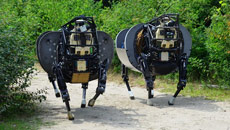After unveiling a smart contact lens that monitors glucose levels in tears in January, Google is now working on to support people with Parkinson's disease - via Google Glass, it much-anticipated wearable device to be launched later this year.
Experts at Newcastle University in Britain are investigating Google Glass as an assistive aid to help people with Parkinson's retain their independence for longer.
In a first such trial, Google has donated five pairs of Google Glass to Newcastle University to allow researchers to test how they could be used to support people with long-term conditions.
“Google Glass opens up a new space for exploring the design and development of wearable systems. The beauty of this research project is we are designing the apps and systems for Glass in collaboration with the users so the resulting applications should exactly meet their needs,” lead researcher John Vines explained.
The team has been working with a group of Parkinson's volunteers aged between 46-70 years.
They are working on the new technology to provide discreet prompts linked to key behaviours typical of Parkinson's, such as reminding the individual to speak up or to swallow to prevent drooling.
Glass can also be used as a personal reminder for things such as medication and appointments.
The team is also exploring how the motion sensors in Glass can be used to support people with 'freezing', a behaviour caused by motor blocking a common symptom of Parkinson's.
Parkinson's disease is a progressive neurological condition affecting up to 10 million people worldwide, with onset generally in those over 50.
The condition manifests itself in motor symptoms including rigidity, tremor and 'bradykinesia' or slowness of movement.
Aside from the physical signs, there are a myriad of emotional and social factors relating to loss of independence, social confidence, embarrassment and stigma.
“Wearable computing is still quite novel but as more people buy into the technology and start to wear it out and about for leisure then systems such as Glass offer us a real opportunity for the long-term treatment of progressive conditions like Parkinson's and dementia,” Roisin McNaney, a speech and language therapist, noted.
The researchers would present their initial findings later this month at the ACM Human Factors in Computing Systems (CHI) 2014 conference in Toronto, Canada.





